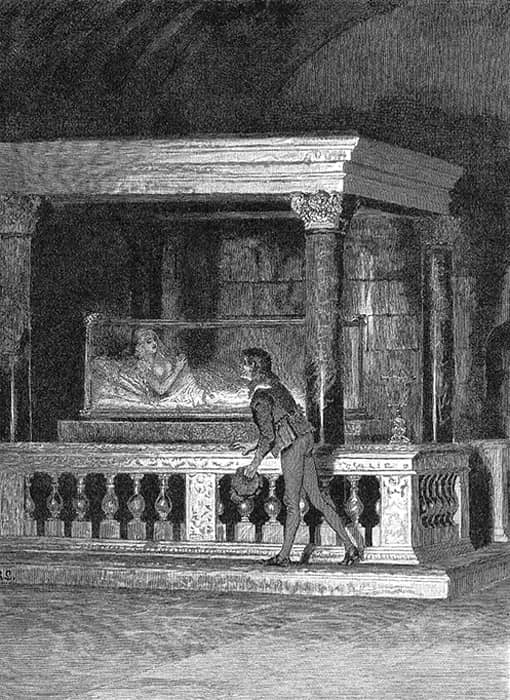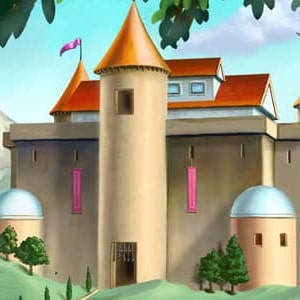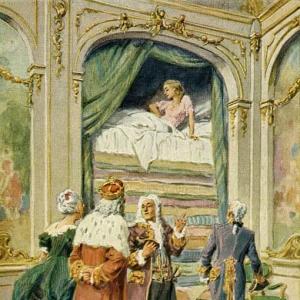Reading time: 17 min
Let no one ever say that a poor tailor cannot do great things and win high honors; all that is needed is that he should go to the right smithy, and what is of most consequence, that he should have good luck. A civil, adroit tailor’s apprentice once went out travelling, and came into a great forest, and, as he did not know the way, he lost himself.

Night fell, and nothing was left for him to do, but to seek a bed in this painful solitude. He might certainly have found a good bed on the soft moss, but the fear of wild beasts let him have no rest there, and at last he was forced to make up his mind to spend the night in a tree. He sought out a high oak, climbed up to the top of it, and thanked God that he had his goose with him, for otherwise the wind which blew over the top of the tree would have carried him away. After he had spent some hours in the darkness, not without fear and trembling, he saw at a very short distance the glimmer of a light, and as he thought that a human habitation might be there, where he would be better off than on the branches of a tree, he got carefully down and went towards the light. It guided him to a small hut that was woven together of reeds and rushes. He knocked boldly, the door opened, and by the light which came forth he saw a little hoary old man who wore a coat made of bits of colored stuff sewn together. „Who are you, and what do you want?“ asked the man in a grumbling voice. „I am a poor tailor,“ he answered, „whom night has surprised here in the wilderness, and I earnestly beg you to take me into your hut until morning.“ – „Go your way,“ replied the old man in a surly voice, „I will have nothing to do with runagates; seek for yourself a shelter elsewhere.“ After these words he was about to slip into his hut again, but the tailor held him so tightly by the corner of his coat, and pleaded so piteously, that the old man, who was not so ill-natured as he wished to appear, was at last softened, and took him into the hut with him where he gave him something to eat, and then pointed out to him a very good bed in a corner.
The weary tailor needed no rocking; but slept sweetly till morning, but even then would not have thought of getting up, if he had not been aroused by a great noise. A violent sound of screaming and roaring forced its way through the thin walls of the hut. The tailor, full of unwonted courage, jumped up, put his clothes on in haste, and hurried out. Then close by the hut, he saw a great black bull and a beautiful stag, which were just preparing for a violent struggle. They rushed at each other with such extreme rage that the ground shook with their trampling, and the air resounded with their cries. For a long time it was uncertain which of the two would gain the victory; at length the stag thrust his horns into his adversary’s body, whereupon the bull fell to the earth with a terrific roar, and was thoroughly despatched by a few strokes from the stag.
The tailor, who had watched the fight with astonishment, was still standing there motionless, when the stag in full career bounded up to him, and before he could escape, caught him up on his great horns. He had not much time to collect his thoughts, for it went in a swift race over stock and stone, mountain and valley, wood and meadow. He held with both hands to the tops of the horns, and resigned himself to his fate. It seemed, however, to him just as if he were flying away. At length the stag stopped in front of a wall of rock, and gently let the tailor down. The tailor, more dead than alive, required a longer time than that to come to himself. When he had in some degree recovered, the stag, which had remained standing by him, pushed its horns with such force against a door which was in the rock, that it sprang open. Flames of fire shot forth, after which followed a great smoke, which hid the stag from his sight. The tailor did not know what to do, or whither to turn, in order to get out of this desert and back to human beings again. Whilst he was standing thus undecided, a voice sounded out of the rock, which cried to him, „Enter without fear, no evil shall befall you thee.“ He hesitated, but driven by a mysterious force, he obeyed the voice and went through the iron-door into a large spacious hall, whose ceiling, walls and floor were made of shining polished square stones, on each of which were cut letters which were unknown to him. He looked at everything full of admiration, and was on the point of going out again, when he once more heard the voice which said to him, „Step on the stone which lies in the middle of the hall, and great good fortune awaits thee.“
His courage had already grown so great that he obeyed the order. The stone began to give way under his feet, and sank slowly down into the depths. When it was once more firm, and the tailor looked round, he found himself in a hall which in size resembled the former. Here, however, there was more to look at and to admire. Hollow places were cut in the walls, in which stood vases of transparent glass which were filled with colored spirit or with a bluish vapour. On the floor of the hall two great glass chests stood opposite to each other, which at once excited his curiosity. When he went to one of them he saw inside it a handsome structure like a castle surrounded by farm-buildings, stables and barns, and a quantity of other good things. Everything was small, but exceedingly carefully and delicately made, and seemed to be cut out by a dexterous hand with the greatest exactitude.
He might not have turned away his eyes from the consideration of this rarity for some time, if the voice had not once more made itself heard. It ordered him to turn round and look at the glass chest which was standing opposite. How his admiration increased when he saw therein a maiden of the greatest beauty! She lay as if asleep, and was wrapped in her long fair hair as in a precious mantle. Her eyes were closely shut, but the brightness of her complexion and a ribbon which her breathing moved to and fro, left no doubt that she was alive. The tailor was looking at the beauty with beating heart, when she suddenly opened her eyes, and started up at the sight of him in joyful terror. „Just Heaven!“ cried she, „my deliverance is at hand! Quick, quick, help me out of my prison. If thou pushest back the bolt of this glass coffin, then I shall be free.“ The tailor obeyed without delay, and she immediately raised up the glass lid, came out and hastened into the corner of the hall, where she covered herself with a large cloak. Then she seated herself on a stone, ordered the young man to come to her, and after she had imprinted a friendly kiss on his lips, she said, „My long-desired deliverer, kind Heaven has guided thee to me, and put an end to my sorrows. On the self- same day when they end, shall thy happiness begin. Thou art the husband chosen for me by Heaven, and shalt pass thy life in unbroken joy, loved by me, and rich to overflowing in every earthly possession. Seat thyself, and listen to the story of my life:
„I am the daughter of a rich count. My parents died when I was still in my tender youth, and recommended me in their last will to my elder brother, by whom I was brought up. We loved each other so tenderly, and were so alike in our way of thinking and our inclinations, that we both embraced the resolution never to marry, but to stay together to the end of our lives. In our house there was no lack of company; neighbors and friends visited us often, and we showed the greatest hospitality to every one. So it came to pass one evening that a stranger came riding to our castle, and, under pretext of not being able to get on to the next place, begged for shelter for the night. We granted his request with ready courtesy, and he entertained us in the most agreeable manner during supper by conversation intermingled with stories. My brother liked the stranger so much that he begged him to spend a couple of days with us, to which, after some hesitation, he consented. We did not rise from table until late in the night, the stranger was shown to room, and I hastened, as I was tired, to lay my limbs in my soft bed. Hardly had I slept for a short time, when the sound of faint and delightful music awoke me. As I could not conceive from whence it came, I wanted to summon my waiting-maid who slept in the next room, but to my astonishment I found that speech was taken away from me by an unknown force. I felt as if a mountain were weighing down my breast, and was unable to make the very slightest sound. In the meantime, by the light of my night-lamp, I saw the stranger enter my room through two doors which were fast bolted. He came to me and said, that by magic arts which were at his command, he had caused the lovely music to sound in order to awaken me, and that he now forced his way through all fastenings with the intention of offering me his hand and heart. My repugnance to his magic arts was, however, so great, that I vouchsafed him no answer. He remained for a time standing without moving, apparently with the idea of waiting for a favorable decision, but as I continued to keep silence, he angrily declared he would revenge himself and find means to punish my pride, and left the room. I passed the night in the greatest disquietude, and only fell asleep towards morning. When I awoke, I hurried to my brother, but did not find him in his room, and the attendants told me that he had ridden forth with the stranger to the chase by daybreak.
„I at once suspected nothing good. I dressed myself quickly, ordered my palfrey to be saddled, and accompanied only by one servant, rode full gallop to the forest. The servant fell with his horse, and could not follow me, for the horse had broken its foot. I pursued my way without halting, and in a few minutes I saw the stranger coming towards me with a beautiful stag which he led by a cord. I asked him where he had left my brother, and how he had come by this stag, out of whose great eyes I saw tears flowing. Instead of answering me, he began to laugh loudly. I fell into a great rage at this, pulled out a pistol and discharged it at the monster; but the ball rebounded from his breast and went into my horse’s head. I fell to the ground, and the stranger muttered some words which deprived me of consciousness.
„When I came to my senses again I found myself in this underground cave in a glass coffin. The magician appeared once again, and said he had changed my brother into a stag, my castle with all that belonged to it, diminished in size by his arts, he had shut up in the other glass chest, and my people, who were all turned into smoke, he had confined in glass bottles. He told me that if I would now comply with his wish, it was an easy thing for him to put everything back in its former state, as he had nothing to do but open the vessels, and everything would return once more to its natural form. I answered him as little as I had done the first time. He vanished and left me in my prison, in which a deep sleep came on me. Amongst the visions which passed before my eyes, that was the most comforting in which a young man came and set me free, and when I opened my eyes today I saw thee, and beheld my dream fulfilled. Help me to accomplish the other things which happened in those visions. The first is that we lift the glass chest in which my castle is enclosed, on to that broad stone.“
As soon as the stone was laden, it began to rise up on high with the maiden and the young man, and mounted through the opening of the ceiling into the upper hall, from whence they then could easily reach the open air. Here the maiden opened the lid, and it was marvellous to behold how the castle, the houses, and the farm buildings which were enclosed, stretched themselves out and grew to their natural size with the greatest rapidity. After this, the maiden and the tailor returned to the cave beneath the earth, and had the vessels which were filled with smoke carried up by the stone. The maiden had scarcely opened the bottles when the blue smoke rushed out and changed itself into living men, in whom she recognized her servants and her people. Her joy was still more increased when her brother, who had killed the magician in the form of the bull, came out of the forest towards them in his human form, and on the self-same day the maiden, in accordance with her promise, gave her hand at the altar to the lucky tailor.
 Learn languages. Double-tap on a word.Learn languages in context with Childstories.org and Deepl.com.
Learn languages. Double-tap on a word.Learn languages in context with Childstories.org and Deepl.com.Backgrounds
Interpretations
Adaptions
Summary
Linguistics
„The Glass Coffin“ is a German fairy tale collected by the Brothers Grimm in their famous compilation, „Grimms‘ Fairy Tales“ (Kinder- und Hausmärchen), first published in 1812. The Brothers Grimm, Jacob and Wilhelm, were German academics, philologists, and lexicographers who collected and published folklore and traditional stories during the 19th century. Their work played a significant role in the popularization and preservation of European folklore.
The story of „The Glass Coffin“ revolves around a humble tailor who embarks on a journey and encounters a series of magical and mysterious events. He ultimately saves a beautiful maiden who has been imprisoned in a glass coffin by an evil magician, and in the process, defeats the magician, restores the kingdom, and marries the maiden.
The fairy tale incorporates several common elements found in European folklore, such as enchanted forests, magical creatures, and the transformation of humans into animals. The story also explores themes such as the triumph of good over evil, the power of love and destiny, and the importance of inner qualities and persistence.
„The Glass Coffin“ has been adapted and retold in various forms, including books, television shows, and other media, and continues to be a popular story enjoyed by audiences worldwide. It is one of the many captivating tales that make up the rich and diverse collection of the Brothers Grimm’s fairy tales.
„The Glass Coffin“ offers several interpretations and themes that can be explored:
The triumph of good over evil: The story shows the eventual triumph of good, represented by the tailor and the maiden, over evil, represented by the magician. The tailor’s courage, kindness, and persistence, along with the maiden’s resilience, ultimately lead to the defeat of the magician and the restoration of the kingdom.
The power of love and destiny: The tale demonstrates the power of love, as the tailor and the maiden are destined to be together. Their love not only frees the maiden from her glass coffin but also restores the kingdom and its people to their rightful state. The story conveys the message that true love can conquer obstacles and bring happiness.
The importance of inner qualities: The tailor, though poor and humble, possesses qualities such as courage, compassion, and determination, which lead him to success and happiness. The story suggests that one’s character and inner qualities are more important than material possessions or social status.
The transformative power of persistence: The tailor’s determination to help the maiden, despite the odds against him, ultimately leads to the restoration of the kingdom and the defeat of the evil magician. This theme underscores the importance of perseverance and the potential for positive change even in seemingly hopeless situations.
The consequences of greed and pride: The magician’s downfall is brought about by his greed for power and control, as well as his pride in his magical abilities. The story serves as a cautionary tale, warning against the dangers of excessive ambition and arrogance.
In summary, „The Glass Coffin“ is a rich and multi-layered fairy tale that explores themes such as the triumph of good over evil, the power of love and destiny, the importance of inner qualities, the transformative power of persistence, and the consequences of greed and pride.
„The Glass Coffin“ has been adapted in various forms of literature, film, and television. Here are some notable adaptations:
„Snow White and the Seven Dwarfs“ (1937): This classic Disney animated film is an adaptation of „Snow White,“ but it features elements from „The Glass Coffin“ as well. Snow White is placed in a glass coffin after she falls under the spell of the evil queen’s poison apple.
„Once Upon a Time“ (TV series, 2011-2018): This popular TV series features several fairy tales, including „The Glass Coffin.“ In the show, the character of Jack discovers a glass coffin containing Princess Abigail, whom he later falls in love with.
„The 10th Kingdom“ (TV mini-series, 2000): This fantasy mini-series features a character named Virginia who finds a glass coffin containing a prince named Wendell. Virginia helps Wendell break the curse that has put him in the coffin.
„The Glass Coffin“ (short film, 2016): This short film directed by Haritz Zubillaga is a modern retelling of the fairy tale. It features a woman who wakes up in a glass coffin and must figure out how she got there.
„The Glass Coffin“ (novel, 2011): This novel by Gabby Catania traces the story of a young woman who is cursed and put in a glass coffin. The novel explores themes of love, loyalty, and the power of human connection.
These adaptations demonstrate the enduring popularity and adaptability of „The Glass Coffin“ as a timeless fairy tale.
„The Glass Coffin“ is a fairy tale by Brothers Grimm that tells the story of a poor tailor who gets lost in a forest while traveling. He spends the night in a tree to avoid wild beasts, and upon waking, sees a light in the distance. Following the light, he finds a small hut inhabited by a grumpy old man wearing a coat made of colored patches. The old man eventually allows the tailor to stay the night, providing food and a bed.
The next morning, the tailor is awakened by the sounds of a fierce battle between a black bull and a beautiful stag. The stag eventually defeats the bull and carries the tailor away on its horns. The stag stops in front of a rock wall and releases the tailor, who hears a voice urging him to enter a hidden hall within the rock. Inside, he discovers a room filled with glass vases and two large glass chests. One chest contains a miniature castle, while the other holds a beautiful sleeping maiden.
The maiden awakens and tells the tailor her story: she is the daughter of a wealthy count who lived with her brother in a castle. One day, a stranger arrived, who used magic to charm her and her brother. When she refused the stranger’s proposal, he turned her brother into a stag, shrunk the castle, and trapped her in the glass coffin. The maiden reveals that the tailor is her destined husband and together they restore the castle and its inhabitants. In the end, the maiden’s brother returns to his human form after killing the magician, and the maiden marries the tailor, fulfilling her promise.
The fairy tale „The Glass Coffin“ by the Brothers Grimm is rich in language and narrative devices that convey themes of transformation, fate, and the triumph of the seemingly powerless over adversity. A linguistic analysis of this tale reveals several key elements:
Structure and Syntax
Narrative Style: The story is recounted in a straightforward, past-tense narrative typical of folk tales. The syntax involves complex sentences with subordinate clauses, lending a sense of timelessness and continuity.
Direct Speech: Dialogue is often used to reveal character and advance the plot. The old man’s gruff responses, the maiden’s pleas, and the stranger’s malevolent declarations convey mood and motivation through their speech patterns.
Lexical Choices
Descriptive Language: The tale is filled with vivid descriptions. Words like „hoary,“ „adroit,“ and „surly“ paint detailed images of characters and settings, enhancing the reader’s experience. The use of adjectives adds depth to the narrative, making it more immersive.
Symbolic Lexicon: Certain terms carry symbolic weight. For example, „glass coffins“ and „transparent glass“ suggest fragility and entrapment, while „fire,“ „smoke,“ and „transformation“ reflect change and magic.
Themes and Motifs
Transformation and Liberation: Central to the story is the theme of transformation, whether it be the maiden’s release from the glass coffin or the brother’s return from stag to human form. Linguistically, this is reflected in verbs such as „released,“ „transformed,“ and „freed. “
–
Luck and Fate: The tale begins with the assertion that luck and the correct path can elevate even a poor tailor to high honor. The phrase „let no one ever say“ functions as a moral directive, emphasizing the role of fate and fortune.
Characterization
The Tailor: The protagonist is constructed through adjectives such as „poor“ and „adroit,“ depicting him as humble yet skillful. His journey from wanderer to hero follows the traditional fairy tale arc, where perseverance and virtue are rewarded.
The Maiden: Her characteristics are highlighted through descriptors of beauty and vulnerability, yet she commands agency through her articulate speech, directing the tailor’s actions.
Cultural Context
Oral Tradition: The story’s repetitive structure, use of the rule of three (three key encounters and magical events), and moral lessons align with its origins in oral tradition. These elements enhance memorability and oral transmission.
Moral Lessons: Typical of Grimm fairy tales, moral lessons about courage, virtue, and justice underpin the narrative. The prosperity that follows good deeds is a recurring motif in folklore.
Symbolism and Imagery
Animals: The stag and bull symbolize natural forces and magical transformation. The animals’ fight and the stag’s guidance suggest a connection to nature and its uncontrollable power.
Enclosed Spaces: The glass coffin and cave represent confinement and stasis, while the castle and open air symbolize liberation and fulfillment.
In summary, „The Glass Coffin“ uses language to weave a rich narrative tapestry that combines vivid imagery, symbolic motifs, and traditional storytelling elements to explore enduring themes of transformation, luck, and virtuous persistence. The linguistic devices employed by the Brothers Grimm serve both to enchant and to impart moral wisdom, in keeping with the traditions of folkloric storytelling.
Information for scientific analysis
Fairy tale statistics | Value |
|---|---|
| Number | KHM 163 |
| Aarne-Thompson-Uther-Index | ATU Typ 410 |
| Translations | DE, EN, DA, ES, FR, PT, IT, JA, NL, PL, RO, RU, TR, VI, ZH |
| Readability Index by Björnsson | 39.7 |
| Flesch-Reading-Ease Index | 70.1 |
| Flesch–Kincaid Grade-Level | 9.9 |
| Gunning Fog Index | 12.6 |
| Coleman–Liau Index | 8.4 |
| SMOG Index | 10.2 |
| Automated Readability Index | 10.8 |
| Character Count | 12.500 |
| Letter Count | 9.772 |
| Sentence Count | 92 |
| Word Count | 2.380 |
| Average Words per Sentence | 25,87 |
| Words with more than 6 letters | 328 |
| Percentage of long words | 13.8% |
| Number of Syllables | 3.108 |
| Average Syllables per Word | 1,31 |
| Words with three Syllables | 135 |
| Percentage Words with three Syllables | 5.7% |

 Facebook
Facebook  Whatsapp
Whatsapp  Messenger
Messenger  Telegram
Telegram Reddit
Reddit














